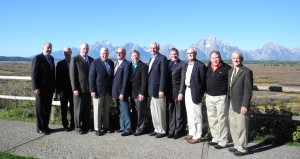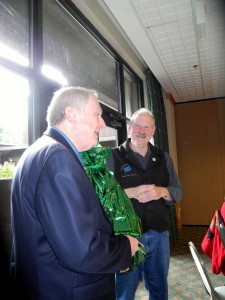
The leadership of the Energy Council and members of the Wyoming Legislature join Alaska Senator Bert Stedman, Chairman of The Energy Council (third from left), in welcoming U.S. Senator Mike Enzi of Wyoming to the Council’s 2013 Annual Meeting. Senator Enzi (fourth from left), delivered the Keynote Address at the Annual Meeting.
I recently traveled to Moran, Wyoming where I had the pleasure of presiding over the Energy Council’s 2013 annual meeting. Over the last year, the Energy Council and my Alaskan colleagues have afforded me an opportunity to introduce energy policy issues of importance to Alaskans to a broader North American constituency. It was my honor, as Chairman of the Energy Council, to showcase Alaskan expertise and highlight Alaskan concerns, while working with legislative energy policymakers from the United States and Canada.
The Energy Council does most of its work during four quarterly meetings that rotate among member states and Canadian provinces, with a spring meeting in Washington, D.C. Participating in the Council is an important part of our continuing efforts to develop Alaska’s energy resources and foster greater collaboration between national policymakers and our state.
One of the major themes of my Chairman’s Strategic Plan for the year was understanding Arctic development in a global context. Over the course of the Council’s conferences, we discussed topics like “Leadership and the Arctic – Why It Matters” and “Energy Exploration and Transportation in the Arctic,” as well as more general topics like “Pacific Energy Trade Triangles.” Among those upon whom I called to lead these discussions were Alaska Lt. Governor Mead Treadwell; the Alaska Oil and Gas Conservation Commission’s Chairman Cathy Foerster; and the University of Alaska Fairbanks Vice Chancellor for Research, Dr. Mark Myers.
These presentations were helpful in developing a constituency for Arctic issues among influential state leaders in the Lower 48. Many of my Energy Council colleagues had never considered the U.S. an Arctic nation, nor Arctic issues to be their own.
The Energy Council also unanimously passed, and sent to Congress, a policy statement urging the federal government to act immediately to address the threat to Alaska’s Arctic environment by properly plugging federal legacy wells and reclaiming surrounding well sites, utilizing federal revenues to do so. Just last month, the Bureau of Land Management released a Legacy Well Strategic Plan outlining priorities and actions it will take in the near-term to plug and clean up legacy wells in the National Petroleum Reserve – Alaska (NPR-A).
Another area of interest to all energy producers is fossil energy trends. Consequently, it was rewarding to lead my Energy Council Executive Committee colleagues on visits to the offshore Deepwater Gulf of Mexico, the Bakken region of North Dakota, and the Powder River Basin of Wyoming.
Technology is essential to energy production and to those areas which are defining energy trends in North America. For instance, the Council spent quite a bit of time learning about fracking technology and related environmental issues, especially water use. While in North Dakota’s Bakken region we visited a frack job site and came to appreciate the technology and environmental challenges involved.
The third major theme from my Strategic Plan for the year, in addition to Arctic development and fossil energy trends, involved electricity and alternative energy development. Discussion of all these topics helped better inform policy makers. However, it is not up to the Council to dictate state policy. Rather, the Energy Council puts the information before legislators and it’s up to individual policy makers to apply it to each state’s particular circumstances.
One of the most valuable meetings, annually, for Alaska legislators is the Council’s Federal Energy and Environmental Matters Conference. While in Washington, D.C., member legislators heard updates from the U.S. Fish and Wildlife Service’s Assistant Director for Endangered Species, the Department of Energy’s Fossil Energy Office, the Administrator of the U.S. Energy Information Administration and received a briefing from officials of the U.S. Navy on Operational Energy Initiatives.
At the State and Provincial Trends Conference in North Dakota, development of the Bakken and impacts on state and local governments was a dominant topic. North Dakota, like Alaska, faces energy transportation challenges which profoundly affect the price they receive for their energy resources. Pipeline infrastructure and oil by rail were two important discussions at that meeting.
Personally, one of the most interesting aspects of the Chairmanship was getting to know the Energy Minister from Canada’s energy powerhouse, Alberta. There is much in common between Alaska and Alberta in terms of resources and market challenges. It seems likely that there are possibilities for cooperative efforts that may benefit both and I will continue to cultivate that relationship.
Certainly, it was an honor to chair the Energy Council on behalf of Alaska and consider all the varied perspectives that were presented over the course of the year. No doubt, the experience will prove to be essential background, as I work with fellow Alaskan legislators to shape the state’s future as an energy provider to North American and world markets. This was my last meeting as Chairman of the Energy Council, a position which alternates each year. Representative Wayne Smith of Texas was the Council’s Vice Chairman and subsequently appointed Chairman at the conclusion of the annual meeting. I will remain a member of the Energy Council’s Executive Committee and I look forward to continuing my work to promote Alaska’s interests through this important group of policy makers.


Comments are closed